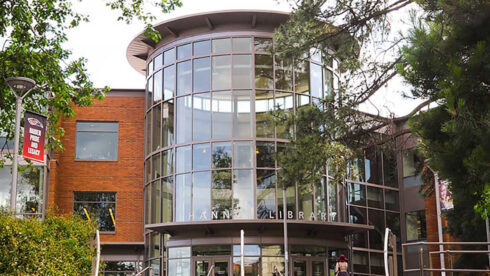Three new bee colonies found a home on the Southern Oregon University campus in mid-May, completing the first stage of a long-term environmental education project developed by graduate student Ryan King.
King, who is currently studying in SOU’s Environmental Education masters program, began the Ashland Apiary Project in August of last year as part of his graduate thesis work, and plans to establish an official SOU Beekeeping Club by September 2012. In the meantime, King and his supporters are partnering with the Southern Oregon Beekeepers Association to help realize their goal.
“Their expertise and support is crucial,” said King, who said his interest in bees began in high school.
“There’s an educational value and an environmental value to beekeeping,” said King. “Honeybees assist in the honey-making process and are responsible for one-third of the country’s food supply, so they are very important to the agricultural system.”
On the educational side, he added, “the great thing about beekeeping is that there are so many opportunities and different applications associated with it.”
King’s project is supported by Sarah Red-Laird, a local beekeeping enthusiast and creator of the online resource beegirl.org. Red-Laird will act as a primary consultant and beekeeping mentor to SOU students starting this fall.
“’Bee Girl’ is a hugely instrumental part of this project’s success,” said King.
Various campus organizations and departments are also rallying behind the project, including the Ecology Center of the Siskiyous, the SOU biology department, and the SOU Foundation. A number of grants may help support the program as well.
Overall however, the largest support for the project is coming from environmental interests, according to Brittany Depew, the SOU Environmental and Community Engagement Coordinator.
“In fact, our Garden Coordinator has worked the most closely with Ryan on this project,” noted Depew.
King said the biggest motivation behind his bee project was to serve as a healthy influence on SOU’s environmental policies.
“We want to discourage SOU from using pesticides and encourage them to adopt more sustainable projects, like beekeeping and planting only native wildflowers, things like that,” he said.
“If we can solve our problems locally, the results bubble out, the benefits ripple out. It’s a model that can be replicable,” King added.
Information about the program and about how to participate is available by contacting Ryan King at mr.ryanjking@gmail.com. Interested students and faculty are also encouraged to visit http://www.beegirl.org for additional information.


